The European countryside shows its strength
From the Netherlands to Poland via Germany and France, the anger of Europe’s farmers has spread across the continent and is winning concessions from presidents and prime ministers
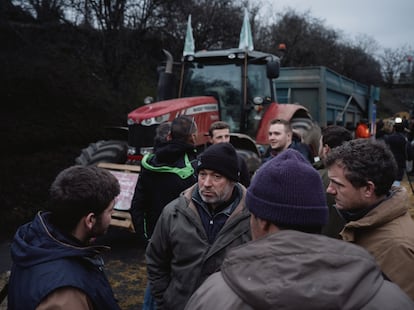

Those in power fear them. Most of their fellow countrymen view farmers with a mix of curiosity and respect. They number only about 9 million or 2% of the European Union’s (EU) population, and they generate only 1.4% of the bloc’s GDP. But they have a level of influence that other social movements and sectors of the economy could only dream of having. What is more, they are using it.
From the Netherlands to Romania, from France to Poland, tractors have blocked city streets and highways. These icons of the European countryside scare those in power and are forcing them to act. “Perhaps this is a turning point,” says Dominique Moïsi, a special advisor to the Montaigne Institute think tank and an observer of the underlying currents agitating Europe and the world. “I get the impression that the farmers feel unstoppable, that their demands are fair, and they are in a strong enough position to make them.”
In each country there are particular demands. For the Polish or Romanian farmer, Ukraine represents closer competition than it does for the Spanish or the French — and the latter enjoys a status in their country that grants them exceptional power and influence. Sometimes interests clash. A recurring complaint in France is the alleged unfair competition from cheaper Spanish products. But some gripes are common across the economic bloc. The complaints from farmers blocking the highways in the Paris region until last Friday are almost identical to those heard on the vegetable farms in the German state of Rhineland-Palatinate.
The European countryside is mobilizing against suffocating fuel taxes in these times of inflation. Farmers are protesting against environmental regulations that are considered excessive and harmful to production, and ecology laws that some describe as punitive. They are protesting against the paperwork and bureaucracy that robs them of more and more time. There is anger towards large industry and large stores that, they say, fleece them and contribute to the decline in their income. They are railing against free trade agreements that, according to them, place them at a disadvantage compared to countries with less strict regulations and lower salaries. And they are worried about, or at least deeply skeptical of, the possibility that Ukraine — an agricultural superpower — will one day join the EU.
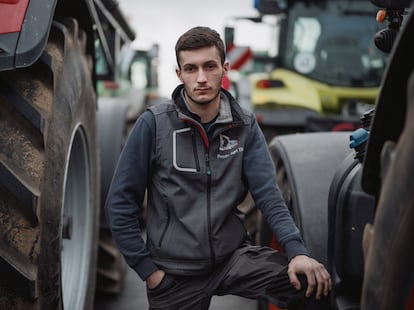
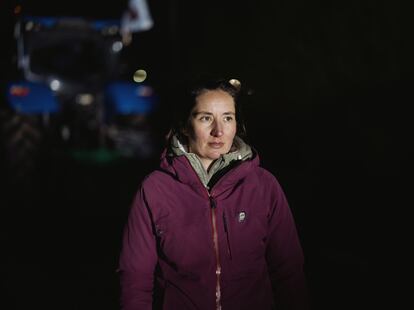

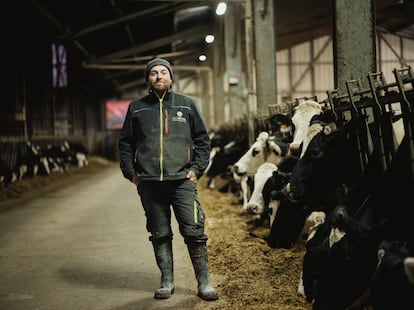
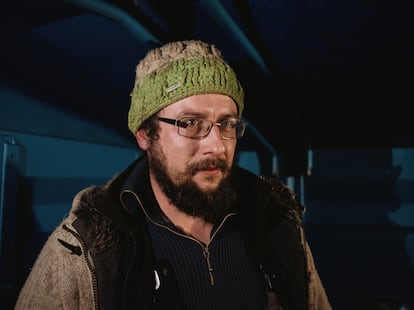
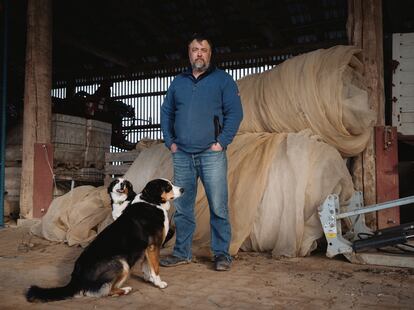
Ukraine and the environment. It is as if the discomfort of the European countryside, and the controlled anger that has been expressed at the beginning of 2024, has touched something essential. The future of Europe and mankind.
Less than six months before a European election in which the populist right hopes to consolidate itself as an alternative to the moderates, and sees an opportunity in the protests, the countryside is showing its strength. It is a tangible force, which farmers wield without a second thought: they feed us all. Or, as 21-year-old Pierre de Lassée, a third generation farmer, said from his tractor this week while blocking the A6 motorway south of Paris: “Without agriculture there would be nothing to eat, and without anything to eat, you would no longer exist and neither would I.”
Farmers also enjoy symbolic capital. For many of us living in an increasingly urbanized and global world, they embody our connection with the land, the very essence of a country. And they have a unique ability to intimidate. They do not need hundreds of thousands of people to take to the streets to make their voices heard. They only need a few tractors to close a highway or paralyze a city.
And it works. With a battery of concessions — some at the expense of the environment — French President Emmanuel Macron and his new Prime Minister Gabriel Attal have defused the two-week protest that had threatened to blockade Paris. Faced with the contagion of the protests that brought tractors to the center of Brussels, the European Commission has proposed repealing the requirement to leave a minimum percentage of land fallow, one of the farmers’ key demands.
“A small minority can stop the country,” says Lucas Lang, a 23-year-old livestock and grain farmer. He is protesting on the outskirts of Buhl, a town about 12 miles from the Franco–German border. And he is not expressing a desire: it is the confirmation of a fact. He speaks Alsatian (his mother tongue), German, and French. He is a true European. In recent weeks, he has gone back and forth between Germany and France, cutting off an old border crossing, or protesting alongside his German colleagues in this corner between Alsace, Baden-Württemberg, and Rhineland-Palatinate. He has seen, like everyone else in Europe, how quickly politicians have responded to some of the farmers’ demands, scared that the movement might become entrenched.
“They are afraid,” says Lang, standing at the entrance to his family farm that has 70 cows and about 250 acres of grain. “They know that without agriculture, there is no country.”
Fear in the corridors of power, or at least respect for farmers, is spreading through in the continent. The alarm was raised by the victory of the Farmer–Citizen Movement (BBB) in the Dutch provincial elections held in March 2023. The rejection of measures to reduce emissions on arable farms propelled this populist party to a majority in the Dutch Senate. And it rang alarm bells. What if efforts to respond to the climate emergency were moving too quickly and risked fueling right-wing populists and radicals?
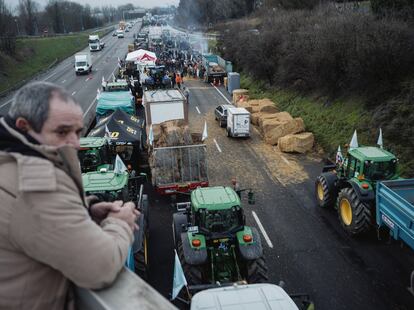
The nightmare of European leaders — those spanning the moderate left to the moderate right, and those who have led the charge on European integration since 1945 — is that a scenario similar to the 2018 yellow vest revolt in France will be repeated. They are thinking about the dissatisfaction of people who live in rural areas or small cities, who depend on fossil fuels to live and work in areas with little public transportation. Or whose livelihood, in the case of many farmers, depends on the use of polluting substances. The argument is that if the burden of fighting climate change falls on that part of the population, it will be fuel for radicals.
In Germany, eliminating agricultural diesel subsidies ignited a movement that brought thousands of tractors to Berlin. At the beginning of the month, the vice chancellor and Minister of Economy and Climate, the environmentalist Robert Habeck, was prevented from disembarking a ferry upon returning from vacation with his family. Later, Habeck criticized those who had blocked him: “Fantasists are calling for a coup, extremist groups are forming, and ethnic-nationalist symbols are being displayed openly.” The thriving far-right group Alternative for Germany (AfD) is trying to take advantage.
About 18 miles separate young Lucas Lang’s farm in Buhl (France) from veteran Jürgen Zapf’s farm in Kandel (Germany). The road crosses the open plains. There is something strange at the entrance to each town. The sign with the town’s name is upside down. Sabotaging the signs is how the farmers began to protest in the fall, but they must have immediately realized that no one in Paris saw it. Nobody paid any attention to them until the tractors came out.
The road enters Scheibenhard, a town that is actually divided in two by the bridge over a stream that serves as a border. On one bank sits Scheibenhard (France), and on the other bank sits Scheibenhardt (with a T at the end) in Germany. The border post stopped being operational in the 1990s, when the barriers were lifted, although they returned briefly during the Covid pandemic. Now the booth is a library with books in French and German sitting side by side on the shelves. This is the epicenter of Europe. These are the lands over which the Germans and French fought for centuries, and where reconciliation was born at the end of World War II, finally bringing about European unity.
“The European Union has brought us 70 years of peace, and 70 years without hunger, thanks to the European project,” says Zapf as he walks visitors through the fields and barns. “That is why we are demonstrating: so that there are another 70 years of the same.”
The A65, the highway that goes up to the industrial city of Ludwigshafen, roars a few meters from the farm. The barn is covered with solar panels. Farmhands work in the neighboring asparagus field. Jürgen Zapf is 53 years old and has three children who also work in agriculture. He shows us the tractor with which he went to Berlin a few days ago. He has stuck a sticker with an image of the capital and a promise: “We will return. This is not over.”
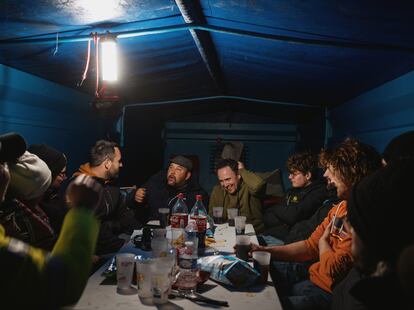
The extreme right? “We farmers are defending other values,” Zapf responds. The sector depends on the EU’s Common Agricultural Policy — the CAP, which accounts for a third of the bloc’s budget — and it would seem incongruous for them to embrace the cause of Euroscepticism. “We are for Europe, not against it,” says the German farmer. “But it must be reformed, so that it does not always consist of new laws, regulations, and decrees.” In neighboring France, Marine Le Pen’s National Rally has worse results among farmers than the national average. But the anti-globalization and anti-bureaucratic message, the grievances against urban elites, and the demonization of environmentalism can work.
“Without Europe we would not have CAP aid, and in the world market, France has more clout thanks to Europe,” insists Alix Heurtaut, a grain and beet grower in the Paris region, as she stands on a blocked highway near Paris.
Almost 345 miles from Jürgen Zapf’s farm, on the A10 south of Paris, there was talk in the middle of the week about Europe and the CAP. And another lament could be heard: the difficulties in making ends meet among small property owners who feel overwhelmed by debt and falling income. Sometimes fiction says it better. “In short,” said the narrator of the novel Serotonin, by Michel Houellebecq, “what’s happening in French agriculture right now is a huge social plan, the biggest social plan in operation, but it is a secret, invisible social plan, in which people disappear individually, in their corners, without ever providing a theme for a news item on BFM [the 24-hour news channel].”
Like many of this author’s novels, it is a terrible and exaggerated portrait of society, but it expresses the deep fears of a part of society. And now there is another threat, which some of the farmers we interviewed see in Ukraine. “Today, it’s killing me,” says Ghislain de la Forge, owner of a 495-acre farm between Paris and Orleans. “It’s not their fault, but they are killing my business. Importing cereals has been made easier and now I’m losing money every day.”
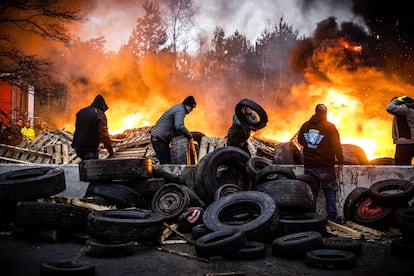
It’s Thursday night on the A10, which has been blocked in both directions. In the trailer of a truck, de la Forge eats and drinks and jokes with a dozen farmers he has met at the protest. They feel tired, and in a few hours they will leave. A few yards from the truck, groups form on the road, plans are made, there is discussion about whether the government’s concessions are enough.
A few miles to the east, on the A6, a screen shows a live broadcast of President Macron’s speech in Brussels. Pierre Lacombe, a 35-year-old cereal farmer, doesn’t pay much attention. The conversation, like so many these days, drifts towards Ukraine: “For me it is unimaginable for the country to enter the EU. “We can’t share what we don’t have anyway.” When asked if the solution is to close the door to Ukrainians and deny them the chance to be European, he replies: “Well, I don’t know what to answer, honestly. I’m just a smallholder from France. “This is a geopolitical issue that I do not control.”
“We will have to explain to the farmers that it is better to have Ukraine with us than against us,” says political scientist Dominique Moïsi, “and that if Ukraine fell into Russia’s hands, imagine the food consequences for the whole of Europe, with the vast agricultural lands the country would control.” He concludes: “We must talk about geopolitics with the farmers.”
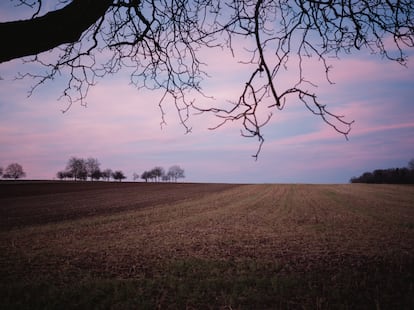
Sign up for our weekly newsletter to get more English-language news coverage from EL PAÍS USA Edition
Tu suscripción se está usando en otro dispositivo
¿Quieres añadir otro usuario a tu suscripción?
Si continúas leyendo en este dispositivo, no se podrá leer en el otro.
FlechaTu suscripción se está usando en otro dispositivo y solo puedes acceder a EL PAÍS desde un dispositivo a la vez.
Si quieres compartir tu cuenta, cambia tu suscripción a la modalidad Premium, así podrás añadir otro usuario. Cada uno accederá con su propia cuenta de email, lo que os permitirá personalizar vuestra experiencia en EL PAÍS.
¿Tienes una suscripción de empresa? Accede aquí para contratar más cuentas.
En el caso de no saber quién está usando tu cuenta, te recomendamos cambiar tu contraseña aquí.
Si decides continuar compartiendo tu cuenta, este mensaje se mostrará en tu dispositivo y en el de la otra persona que está usando tu cuenta de forma indefinida, afectando a tu experiencia de lectura. Puedes consultar aquí los términos y condiciones de la suscripción digital.








































